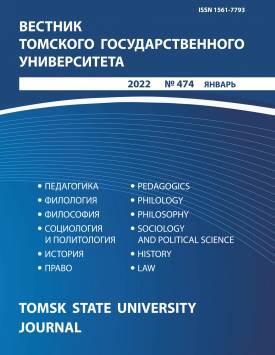Organizational and pedagogical conditions as factors of the quality of education of Russian language teaching in bilingual rural schools
In the Russian Federation, bilingualism and multilingualism are becoming an integral part of modern society. The problem of ensuring the availability of quality education, regardless of the place of residence and the language of instruction, is a priority task of the Russian education system. Organizational and pedagogical conditions can become one of the factors for obtaining high-quality education, regardless of the place of residence and language of education of students. The article presents the results of a study aimed at identifying organizational and pedagogical conditions that contribute to improving the quality of Russian language teaching in rural schools that conduct educational activities in their native language. A leading research method is questionnaire survey, which involved respondents from four regions - the Republic of Altai, Republic of Sakha (Yakutia), Tatarstan, Tuva - in which official languages are Russian and that of the republics. The research material was based on the responses to questionnaires of 368 respondents in three groups: heads of rural educational organizations, Russian language teachers, students in grades 5-9 and their parents. In addition, the following methods were used: observation, conversation, interviews, questionnaires, content analysis, and study of school documentation. Based on the theoretical analysis of sources on the research topic, the concept of “organizational and pedagogical conditions” was specified; the definitions of the types of conditions - motivational, administrative and managerial, personnel, material and technical, control and evaluation - were clarified and formulated. The results of the study allowed identifying these conditions as factors that ensure quality and presenting them in terms of motivation (for what purpose?), organization (what and how?), personnel (who?), logistics (where and by what?) and evaluation and control (how?). The results obtained helped to formulate methodological recommendations for creating organizational and pedagogical conditions as a set of certain pedagogical measures to influence participants in educational relations. These measures ensure the improvement of the quality of education and are aimed at the formation of balanced bilingualism in children in bilingual education. For our multilingual country, state support for Russian and the native languages of its peoples is necessary not only as a factor of sociopolitical development, but also as a guarantee of state security of a multinational state.
Keywords
organizational and pedagogical conditions, quality of education, bilingual education, rural schoolAuthors
| Name | Organization | |
| Ivanova Alena V. | Federal Institute of Native Languages of Peoples of the Russian Federation | alivv@yandex.ru |
References

Organizational and pedagogical conditions as factors of the quality of education of Russian language teaching in bilingual rural schools | Vestnik Tomskogo gosudarstvennogo universiteta – Tomsk State University Journal. 2022. № 474. DOI: 10.17223/15617793/474/2
